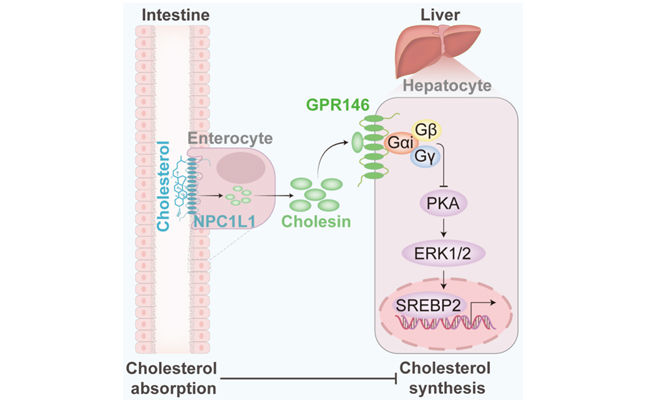On March 18th, a research paper titled "A gut-derived hormone regulates cholesterol metabolism" was published in the journal Cell by a team led by Drs. Yiguo Wang from the School of Life Sciences at Tsinghua University and Huijie Zhang from the affiliated Nanfang Hospital of Southern Medical University. This research unveiled a novel intestinal hormone named Cholesin and elucidated its role and mechanism in regulating cholesterol homeostasis in the body.
Maintaining cholesterol balance is crucial for overall health, involving coordination among various tissues for processes such as absorption of exogenous cholesterol, de novo cholesterol synthesis, and bile clearance and excretion. Elevated cholesterol levels, especially low-density lipoprotein cholesterol (LDL-C), increase the risk of cardiovascular diseases like atherosclerosis. Mainstream medications such as statins and PCSK9 inhibitors primarily target LDL-C levels. Although the reciprocal relationship between cholesterol synthesis in the intestine and absorption in the liver is known to regulate circulating cholesterol, the specific factors and mechanisms governing this balance remain poorly understood.
To address this knowledge gap, researchers analyzed mouse plasma proteins after dietary interventions and identified a previously uncharacterized gene, 3110082I17Rik (a homolog of human C7orf50), as encoding a protein now termed Cholesin. This hormone, primarily expressed in the intestines, inhibits hepatic cholesterol synthesis, suggesting its role in regulating cholesterol absorption. Knockout studies confirmed Cholesin's secretion in response to NPC1L1-mediated cholesterol uptake and its role in inhibiting hepatic cholesterol synthesis. Human genetic studies also revealed Cholesin's association with plasma cholesterol levels, further underscoring its significance.
Mechanistically, Cholesin acts via the GPR146 receptor, suppressing hepatic cholesterol synthesis mediated by SREBP2 through PKA signaling inhibition. Exogenous Cholesin administration effectively reduced cholesterol levels in mouse models of hypercholesterolemia and atherosclerosis, particularly when combined with rosuvastatin.
In summary, this groundbreaking study identifies Cholesin as a pivotal regulator of cholesterol homeostasis, offering potential therapeutic avenues for cholesterol-related diseases. Drs. Yiguo Wang and Huijie Zhang are co-corresponding authors, and the study received support from various funding sources, including the Ministry of Science and Technology and the National Natural Science Foundation of China.

A Cholesin-GPR146 axis links cholesterol absorption in the intestine to inhibition of cholesterol synthesis in the liver, thereby providing protection against hypercholesterolemia and atherosclerosis.
Editor: Li Han

